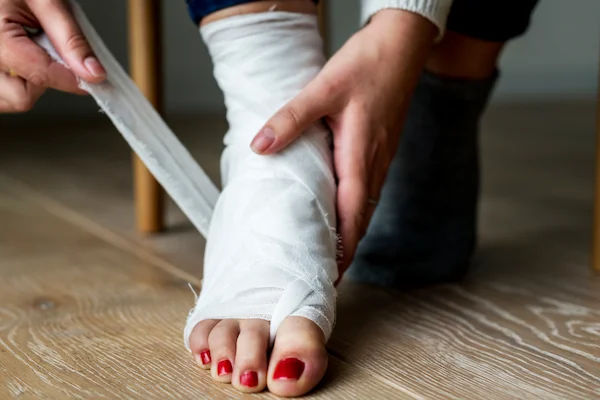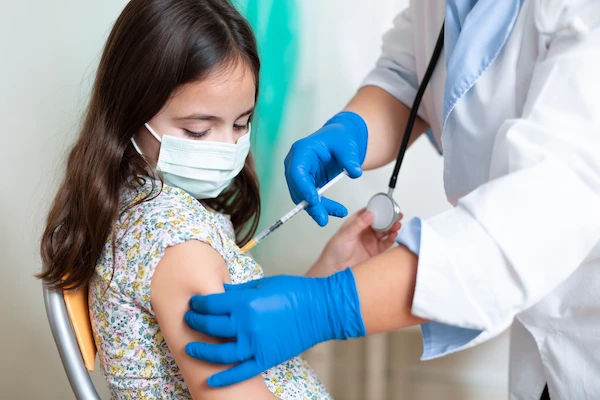Guide to Follow Paediatric Vaccination Schedule Amidst Covid Pandemic
Stay informed and ensure your child’s health with our comprehensive guide on following the paediatric vaccination schedule safely during the COVID-19 pandemic.

Written by Dr. Dhankecha Mayank Dineshbhai
Reviewed by Dr. Md Yusuf Shareef MBBS
Last updated on 13th Jan, 2026
.webp?tr=q-80,f-webp,w-350,dpr-2,c-at_max 700w)
The COVID-19 pandemic has reshaped our approach to healthcare, leaving many parents anxious about routine medical visits, especially for their little ones. Questions about safety, timing, and necessity are more common than ever. However, one aspect of child healthcare that remains critically important is adhering to the paediatric vaccination schedule. This guide is designed to address your concerns head-on, providing a clear, safe, and actionable path to ensuring your child is protected against dangerous but preventable diseases, even amidst the complexities of the ongoing pandemic. We will walk you through the importance of timely immunization, the safety measures clinics have in place, a detailed breakdown of the schedule, and how to manage any missed doses. Your child's health is paramount, and staying on track with vaccinations is a powerful step in safeguarding their future.
Why Sticking to the Paediatric Vaccination Schedule is Non-Negotiable?
The recommended vaccination timeline is not arbitrary; it is scientifically designed to protect children when they are most vulnerable to specific diseases. Delaying or skipping vaccines can leave a window of opportunity for serious illnesses like measles, whooping cough, or polio.
The Double Shield: Protection from Common Illnesses and Covid-19
While COVID-19 rightfully captured our attention, other infectious diseases did not disappear. In fact, disruptions in routine immunization programs globally have led to outbreaks of measles and other diseases. Keeping your child’s vaccinations up-to-date provides an essential shield against these known threats. Furthermore, a child protected from common childhood illnesses is less likely to require medical visits or hospitalizations, thereby reducing their potential exposure to COVID-19 and other infections in healthcare settings. It’s a proactive layer of defense that benefits your child’s overall health.
The Domino Effect of Delayed Vaccinations
When a significant number of children delay their vaccines, it weakens the community's "herd immunity." This protection is vital for those who cannot be vaccinated, such as newborns or immunocompromised children. A decline in vaccination rates can lead to the resurgence of diseases that were previously under control. Sticking to the schedule ensures your child is protected individually and contributes to the broader health of your community.
Consult an General Physician
Navigating Vaccination Appointments Safely During the Pandemic
Healthcare providers have implemented rigorous safety protocols to make clinics and hospitals safe for well-baby visits and vaccinations.
Clinic Safety Protocols: What to Expect
Most clinics now enforce strict measures including:
Scheduled Appointments: Well-visits and sick-visits are often separated by time or location to minimize contact.
Mandatory Masking: All staff and visitors (above age 2) are required to wear masks.
Temperature Checks and Screening: Pre-entry screening for symptoms is standard.
Physical Distancing: Waiting rooms are reconfigured, and you may be asked to wait in your car until the doctor is ready.
Enhanced Sanitization: High-touch surfaces are cleaned continuously throughout the day.
Preparing for Your Visit: A Parent's Checklist
To make your visit smooth and safe:
Call Ahead: Confirm your appointment and ask about specific COVID-19 protocols.
Fill Forms Online: Complete any registration paperwork digitally beforehand.
Limit Attendees: Bring only the child and one parent/guardian if possible.
Pack Smart: Bring your own toys and a blanket for the baby. Use a baby carrier instead of a pram to minimize touching surfaces.
Sanitize: Use hand sanitizer before and after the visit.
If you have any concerns about your child's health before the visit, consult a paediatrician online with Apollo24|7 for guidance.
The Indian Paediatric Vaccination Schedule: A Detailed Breakdown
The following chart is based on the recommendations of the Indian Academy of Paediatrics (IAP). It's crucial to discuss this with your paediatrician, as they may suggest additional vaccines based on your child's specific health needs.
(Concept for a Custom Infographic: A clean, colour-coded timeline from Birth to 10 Years, with icons for each vaccine (e.g., a droplet for BCG, a virus shape for Polio). Columns would be: Age, Vaccine Name, Key Purpose.)
Birth to 6 Weeks: The Critical Foundation
This period sets up the first line of defense.
At Birth: BCG (for tuberculosis), Hepatitis B-1, Oral Polio Vaccine (OPV)-0.
6 Weeks: A major appointment including DPT-1 (Diphtheria, Pertussis, Tetanus), Hepatitis B-2, OPV-1, HiB-1, Rotavirus-1, and Pneumococcal Conjugate Vaccine (PCV)-1.
6 Weeks to 9 Months: The Core Immunization Phase
This is when most primary doses are administered.
10 & 14 Weeks: Follow-up doses for DPT, OPV, HiB, Rotavirus, and PCV.
6-9 Months: OPV dose, and importantly, the Influenza vaccine (yearly). This is especially relevant now to prevent flu symptoms that can be confused with COVID-19.
12 Months to 10 Years: Booster Shots and Catch-up Vaccines
These doses are essential to reinforce immunity as the initial protection wanes.
12-15 Months: Booster doses for PCV, MMR-1 (Measles, Mumps, Rubella).
16-18 Months: Boosters for DPT, OPV, HiB, and the first dose of Hepatitis A.
4-6 Years: Boosters for DPT, OPV, and MMR-2.
10-12 Years: Tdap/Td (Tetanus, diphtheria, pertussis) booster and HPV vaccine (for prevention of cervical and other cancers).
Covid-19 and Your Child: Where Does the Vaccine Fit In?
The COVID-19 vaccine is now a key part of adolescent and paediatric healthcare. Vaccines are approved and recommended for children above a certain age (varies by country and vaccine type). The covid vaccine for children above 5 years is safe and effective at reducing the risk of severe illness. It is administered separately from the routine immunization schedule. Discuss the timing and type of COVID-19 vaccine for your child with your paediatrician to integrate it seamlessly into their overall health plan.
Addressing Common Parental Concerns Post-Pandemic
"What if My Child Missed a Vaccine?": The Catch-up Schedule
Do not panic if your child’s vaccinations are delayed. Paediatricians have a scientifically designed catch-up immunization schedule for delayed vaccines. The principle is to give the missed doses as soon as possible without restarting the entire series. Your doctor will create a personalized plan to get your child back on track efficiently and safely.
Managing Fever and Side Effects at Home
Mild side effects like low-grade fever, fussiness, or soreness at the injection site are normal signs that the immune system is responding. You can:
Use a cool cloth on the injection site.
Offer plenty of fluids.
Dress your child in light clothing if they have a fever.
Consult your doctor about giving paracetamol if the fever is causing discomfort. If the fever is high (above 102°F) or persists beyond 48 hours, consult a doctor online with Apollo24|7 for further evaluation.
Conclusion
Navigating your child's healthcare in the wake of the COVID-19 pandemic requires a balanced approach of caution and proactive care. While it's natural to feel concerned, it's vital to remember that the dangers of vaccine-preventable diseases far outweigh the risks associated with a well-managed clinic visit. The paediatric vaccination schedule is a time-tested shield, meticulously crafted by medical experts to provide optimal protection throughout childhood. By understanding the safety measures in place, familiarizing yourself with the schedule, and working closely with your paediatrician, you can confidently ensure your child receives the life-saving protection they need. Let’s use the lessons of the pandemic to reaffirm our commitment to preventive healthcare, building a healthier future for our children, one vaccination at a time. If you are unsure about your child's vaccination status, book a consultation with a paediatrician on Apollo24|7 to create a personalized plan.
Consult an General Physician
Consult an General Physician

Dr. Rajib Ghose
General Physician/ Internal Medicine Specialist
25 Years • MBBS
East Midnapore
VIVEKANANDA SEBA SADAN, East Midnapore

Dr. Rajib Ghose
General Physician/ Internal Medicine Specialist
26 Years • MBBS
Kolkata
B Ghose Foundation Doctor's Chamber, Kolkata
(50+ Patients)

Dr. Santanu Mandal
General Physician/ Internal Medicine Specialist
18 Years • MD (Physician), DNB (General Medicine)
Kolkata
MCR SUPER SPECIALITY POLY CLINIC & PATHOLOGY, Kolkata
(25+ Patients)

Dr. Swaroopa Rani
General Physician/ Internal Medicine Specialist
9 Years • MBBS, MD (Internal Medicine)
Bengaluru
Apollo Medical Center, Marathahalli, Bengaluru

Dr. Subrata Biswas
General Physician/ Internal Medicine Specialist
34 Years • MBBS,MD General Medicine
Kolkatta
Maruti Clinic, Kolkatta
More articles from Preventive Treatment
Frequently Asked Questions
1. Is it safe to get my baby vaccinated if they have a mild cold or cough?
Yes, it is generally safe. Mild illnesses without fever do not interfere with a vaccine's effectiveness or increase the risk of serious side effects. However, always inform your paediatrician about your child's symptoms before the appointment.
2. What is the minimum gap required between two different vaccines?
Most inactivated vaccines can be given simultaneously or at any interval. Live vaccines not given on the same day should typically be spaced at least four weeks apart. Your doctor will follow the recommended IAP schedule to ensure correct timing.
3. Can the COVID-19 vaccine be given along with other routine vaccines?
Yes, co-administration of the COVID-19 vaccine with other routine vaccines is now considered safe and effective for children and adults, simplifying the immunization process.
4. My child missed the Rotavirus vaccine after 8 months. Can they get it later?
No, the Rotavirus vaccine has a strict age limit. The first dose must be given by 15 weeks and the last by 8 months. If missed, it cannot be given later. Discuss with your doctor about other ways to protect against rotavirus.
5. How can I keep a record of my child's vaccinations?
You will receive a vaccination card from your hospital. Keep it safe. You can also ask your paediatrician if they are part of a digital health record system. Apollo24|7 offers a comprehensive digital health record where you can track all your family's medical history, including vaccinations




